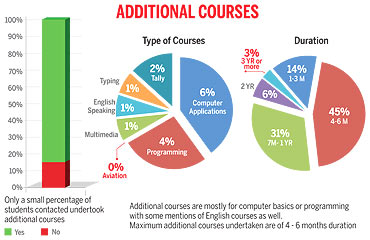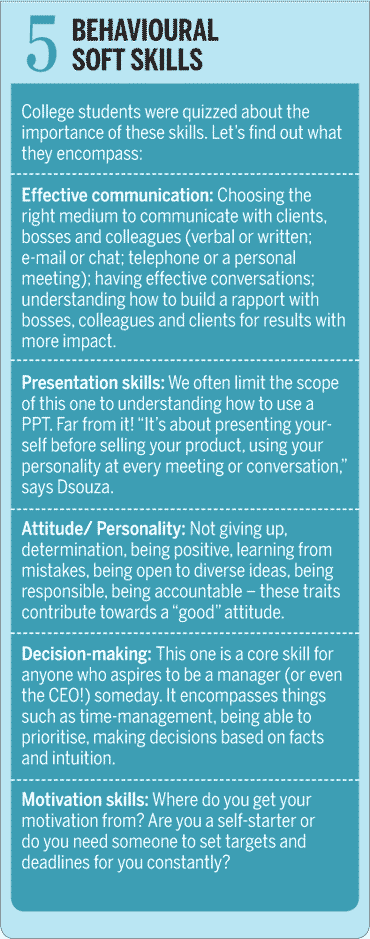
Recently, research firm Frost & Sullivan conducted a survey on soft skills for training company Indian School of Integrated Learning (ISIL). College students pursuing graduation as well as non-degree programmes at technical institutes (ITI) and computer training institutes in the three metros Bangalore, Delhi and Mumbai, were quizzed.
According to the results, about 15 per cent of all students had joined additional courses outside of their college programme. Of this, a sizeable chunk was learning computer basics (39 per cent), programming (27 per cent) and accounting packages (13 per cent). Not many opted for soft skills training (21 per cent) (just 3 per cent of the total sample size). Yet, students from all cities felt that soft skills such as communication, presentation, decision-making, motivation and a good attitude (see box) could enhance their chances of bagging a good job.
Melissa Dsouza, a corporate trainer with ISIL, describes these skills as behavioural skills, because they do not require you to alter your personality but the manner in which you act and react in challenging situations at the workplace, such as a job interview, a meeting, an appraisal, an official get-together and other work-related scenarios.
For instance, job interviews can prove to be overwhelming experiences. You have to be confident but not arrogant. Polite yet not submissive. You have 45 minutes to demonstrate your domain knowledge/ skills in your field and make a good impression. Phew! If that sounds like a tedious laundry list of rules, Dsouza justifies them rather well. She says, "You never get a second chance to make a good first impression."
Say you make it to the shortlist and the only barrier standing between you and this job is another candidate who is as proficient as you in your chosen domain. The company must make a choice, and one factor that could give the winning candidate an edge is his or her soft skills -- deceptively simple things such as being able to handle international clients with ease, being receptive to negative feedback and having a pleasant disposition.
It's not rocket science but these attributes play an important role in making you more appealing to employers. In a competitive scenario they can even tilt the odds in your favour doing hiring, and throughout your career.

There's nothing you cannot change," says Dsouza with conviction. But how do you get started? How do you know what habits to imbibe? How do you do it without becoming a clone of any other efficient professional?
"Self-awareness to begin with," recommends Amanda Vickers, Managing Director of Speak-First, a British training company.
Amanda highlights one department where Indian professionals often tend to err, "Being assertive especially when you need to ask someone for a favour or to perform a task for you." Typically, most professionals tend to be either too aggressive or too submissive when doing either; this hampers the ability to get what you want.
On a positive note, we Indians tend to have less trouble with spoken English as compared to our counterparts in China
or the Philippines. "However, there's much work to be done when it comes to the written word," Amanda points out. Written communication comprises everything from composing an e-mail for your boss or client, to writing an effective cover letter to a potential employer.
"Using too much italic, all caps and a variety of fonts in your mail is not a good idea," says Dsouza. You may not realise it, but these embellishments can make reading very tedious for the recipient, whereas using bullets is a good idea when communicating several points in one e-mail.
Cross-cultural communication on e-mail and otherwise is yet another challenge. Familiarising yourself with the cultures of different countries will help you commit less faux pas at work; understand their communication styles and risk appetites, and break stereotypes about that culture. Dsouza sites two common prejudices from her classroom, both equally surprising in this day and age.
"When Indians see an African person, they tend to think they could be muggers. And students still tend to assume that someone sporting glasses is intelligent!" says Dsouza.

According to Amanda, those involved in technical functions need to improve their communication skills the most, since they need to communicate with clients, colleagues, sales teams, suppliers and more. "But ironically techies have an appetite for improving their communication techniques, where as those in functions such as marketing or journalism tend to be more complacent about improving their soft skills," she observes. Moral of the story: everyone has scope for improvement.
Other skills that can be developed include interviewing skills (especially for managers) and making a personal impact at work. "Are you that person who goes by unnoticed in a room during a meeting? Simple things like using "power words" will make you more memorable. For instance, instead "maybe we could meet soon?" say, 'I look forward to meeting you soon'," says Dsouza.
The big question is how do you equip yourself with all these skills? One way is to join an institute, which offers soft skills training in the areas mentioned in this article. But of course this comes at a price. According to Dsouza, you must have a basic level of English to truly benefit from the programme. "We do not teach you English but help you sharpen communication and other skills. You must already be able to construct sentences in any manner. Some grammatical errors are fine," she says.
She offers a tip to improve English language skills. Add three new words to your vocabulary every week by marking them out in your newspaper. Write them down in your diary, check the dictionary for meanings and make it a point to use these three words in the coming week when speaking. "Make mistakes. But you will grow, "she advises.
Amanda suggests spending time with a person you respect and admire. It could be a lecturer or an executive. Observe them, learn from them, get feedback and apply it, everyday. Ultimately, there's no magic formula to improve skills like communication, networking and your attitude. It's a work in progress, and only self-awareness and practice, makes perfect.
Finally